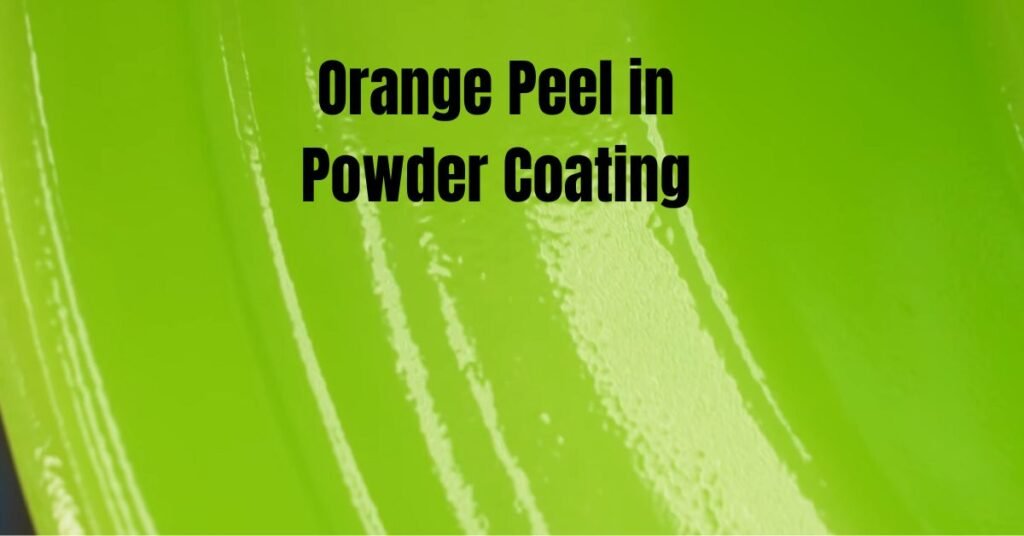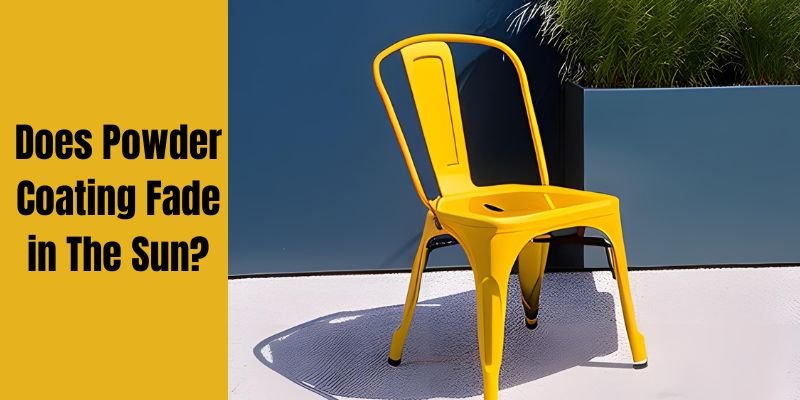Yes, powder coating is generally considered to be water-resistant and can provide a level of protection against moisture. The powder coating process involves applying a dry powder to a surface and then curing it under heat, creating a hard and durable finish.
This coating forms a protective barrier that helps to prevent water penetration and protect the underlying material from corrosion and damage.
However, it’s important to note that the effectiveness of powder coating in waterproofing can vary depending on the quality of the coating, the application process, and the specific environmental conditions it is exposed to.

Waterproof Qualities of Powder Coating
When it comes to waterproofing, powder coating is an excellent choice. This type of coating is designed to provide a protective layer that can withstand exposure to water and other elements. Here are some of the reasons why powder coating is considered waterproof:
Thickness
Powder coating is a thick coating that provides a barrier against water and other liquids. The thickness of the coating can vary depending on the application, but it is generally thicker than traditional liquid coatings.
Adhesion
Powder coating adheres well to surfaces, which helps to prevent water from seeping through. This is because the powder is electrostatically charged and is attracted to the metal surface, creating a strong bond.
Durability
Powder coating is known for its durability and resistance to chipping, peeling, and fading. This means that the coating will not break down easily when exposed to water or other elements.
Sealant
Powder coating can also act as a sealant, preventing water from penetrating the surface of the metal. This is especially important for outdoor applications where the metal is exposed to rain, snow, and other forms of precipitation.
Overall, powder coating is an excellent choice for waterproofing metal surfaces. Its thickness, adhesion, durability, and sealant properties make it an effective barrier against water and other liquids.
Factors Influencing Waterproofness of Powder Coating
When it comes to powder coating, one of the most common questions is whether or not it is waterproof. We would say that there are several factors that can influence the water resistance of powder coating.
Material Type
The type of material being coated can play a significant role in the waterproofness of the powder coating. Some materials are naturally more porous than others, which can affect how well the coating adheres and how well it repels water. For example, metals like aluminum and stainless steel tend to be naturally more resistant to water, while plastics and wood may require additional steps to ensure proper waterproofing.
Coating Thickness
The thickness of the powder coating can also impact its waterproofness. A thicker coating may provide more protection against water intrusion, but it can also make the surface more prone to cracking and peeling. On the other hand, a thinner coating may be more flexible and less likely to crack, but it may not provide as much protection against water.
Application Process
The way the powder coating is applied can also affect its waterproofness. Proper surface preparation is critical to ensuring that the coating adheres well and creates a strong, waterproof barrier. Additionally, the curing process must be carefully controlled to ensure that the coating fully hardens and creates a durable, waterproof finish.
While powder coating can be waterproof, there are several factors that can influence its effectiveness. By carefully considering the material type, coating thickness, and application process, you can create a waterproof powder coating that provides long-lasting protection against water intrusion.
Benefits of Waterproof Powder Coating
If you are looking for a coating that will provide superior protection against water and moisture, then waterproof powder coating is a great option for you. Here are some benefits of using waterproof powder coating:
- Long-Lasting Protection: Waterproof powder coating provides long-lasting protection against water and moisture. This coating is highly resistant to water and moisture, which means that it can protect your surfaces for years to come.
- Prevents Corrosion: One of the main benefits of waterproof powder coating is that it prevents corrosion. Corrosion is a common problem that occurs when metal surfaces are exposed to water and moisture. Waterproof powder coating creates a barrier that prevents water and moisture from coming into contact with the metal surface, which helps prevent corrosion.
- Easy to Clean: Another benefit of waterproof powder coating is that it is easy to clean. This coating is highly resistant to stains, dirt, and grime, which means that it can be easily cleaned with soap and water.
- Versatile: Waterproof powder coating can be used on a variety of surfaces, including metal, plastic, and wood. This makes it a versatile coating option for a wide range of applications.
- Environmentally Friendly: Unlike other coating options, waterproof powder coating is environmentally friendly. This coating is free of VOCs (volatile organic compounds), which means that it does not release harmful chemicals into the environment.
Overall, waterproof powder coating is a great option if you are looking for a coating that provides long-lasting protection against water and moisture. With its ability to prevent corrosion, easy-to-clean surface, and versatility, waterproof powder coating is a reliable and effective coating option for a wide range of applications.
Limitations of Waterproof Powder Coating
While powder coating is a durable and long-lasting finish, it is important to understand that there are limitations to its waterproof capabilities. Here are a few things to keep in mind:
- Not 100% Waterproof: Powder coating is not completely waterproof. While it can resist water to some extent, it is not designed to be completely impervious to water. Over time, water can penetrate the coating and cause damage to the underlying surface.
- Limited Protection Against Chemicals: Powder coating provides limited protection against chemicals. If exposed to harsh chemicals such as acids or solvents, the coating can break down and become damaged.
- Not Suitable for Submerged Applications: Powder coating is not suitable for submerged applications. If the coating is constantly exposed to water, it can start to break down and lose its protective properties.
- Prone to Chipping and Scratching: Powder coating can be prone to chipping and scratching, especially if subjected to heavy use or impact. Once the coating is damaged, water can penetrate the surface and cause damage to the underlying material.
- Requires Proper Maintenance: To ensure the longevity of your powder coating, it is important to properly maintain it. This includes regular cleaning and inspection, as well as touch-up repairs as needed.
Overall, while powder coating can provide some level of waterproof protection, it is important to understand its limitations and take proper precautions to ensure its longevity.
Common Uses of Waterproof Powder Coating
Powder coating is a popular finishing technique used to enhance the appearance and durability of metal surfaces. However, not all powder coatings are waterproof. If you need a coating that can withstand exposure to water or moisture, you should consider using waterproof powder coating. Here are some common applications of waterproof powder coating:
Outdoor Furniture
Outdoor furniture is exposed to various weather conditions, including rain, snow, and humidity. Waterproof powder coating can protect metal furniture from rust, corrosion, and fading caused by exposure to moisture. This type of coating is available in different colors and textures, allowing you to customize the appearance of your furniture while ensuring its longevity.
Automotive Parts
Automotive parts are constantly exposed to water, salt, and other corrosive substances on the road. Waterproof powder coating can protect car parts such as wheels, bumpers, and frames from rust and corrosion. This type of coating is also resistant to impact and abrasion, making it ideal for off-road vehicles and heavy-duty trucks.
Marine Equipment
Marine equipment such as boats, docks, and buoys are exposed to saltwater and other harsh environmental conditions. Waterproof powder coating can protect metal surfaces from corrosion and degradation caused by exposure to saltwater and UV rays. This type of coating is also resistant to fading, chalking, and peeling, ensuring that your marine equipment looks good and performs well for years to come.
Electrical Enclosures
Electrical enclosures are used to protect sensitive electronic components from moisture, dust, and other contaminants. Waterproof powder coating can provide an additional layer of protection to these enclosures, preventing water and humidity from damaging the sensitive components inside. This type of coating is also resistant to chemical exposure and high temperatures, making it suitable for harsh industrial environments.
In conclusion, waterproof powder coating is an effective solution for protecting metal surfaces from moisture and corrosion. It is widely used in various industries, including outdoor furniture, automotive, marine, and industrial applications. By choosing the right type of waterproof powder coating, you can ensure that your metal surfaces remain durable and attractive in any environment.
Maintenance of Waterproof Powder Coating
To ensure that your powder-coated surfaces remain waterproof, regular maintenance is required. Here are some tips on how to properly maintain your waterproof powder coating:
Clean Regularly
Dirt and debris can accumulate on the surface of your powder-coated items, which can weaken the coating and make it less effective at repelling water. To prevent this, it’s important to clean your powder-coated surfaces regularly. Use a soft brush or cloth and mild soap and water to gently scrub the surface. Avoid using abrasive cleaners or tools that can scratch the coating.
Inspect for Damage
Over time, your powder-coated surfaces may become damaged or chipped, which can compromise the waterproofing. Inspect your items regularly for any signs of damage, and repair them immediately. Use touch-up paint or a clear coat to repair any chips or scratches.
Avoid Harsh Chemicals
Harsh chemicals can damage your powder-coated surfaces and strip away the waterproofing. Avoid using cleaners that contain bleach, ammonia, or other harsh chemicals. Instead, use a mild soap and water solution.
Protect from UV Rays
Exposure to UV rays can cause your powder-coated surfaces to fade and weaken over time. To protect your items from UV damage, keep them out of direct sunlight as much as possible. If your items must be exposed to sunlight, consider using a UV-resistant clear coat to protect the powder coating.
By following these maintenance tips, you can ensure that your powder-coated surfaces remain waterproof and effective for years to come.
Conclusion
In conclusion, powder coating can provide a level of water resistance, but it is not completely waterproof. While the coating can protect against moisture and prevent rust and corrosion, it is not designed to provide a complete seal against water.
If you are considering using powder coating for an outdoor project, it is important to keep in mind that the coating may not be able to withstand prolonged exposure to water. You may need to take additional measures, such as applying a sealant or using a different type of coating, to ensure that your project is fully protected against water damage.


